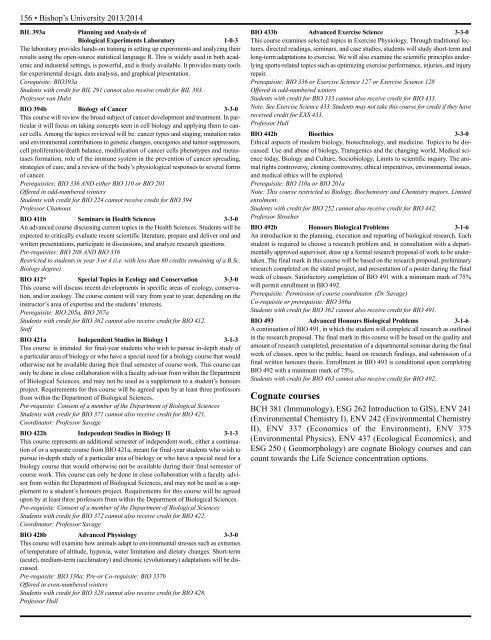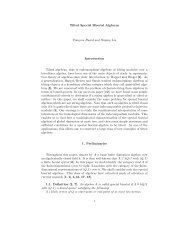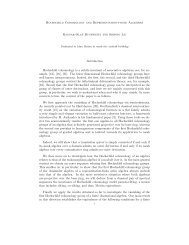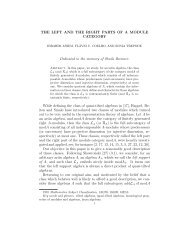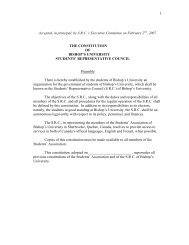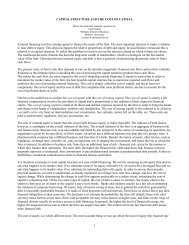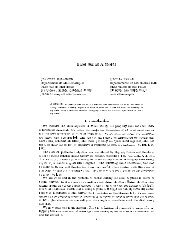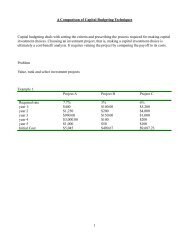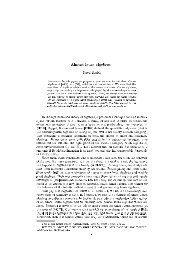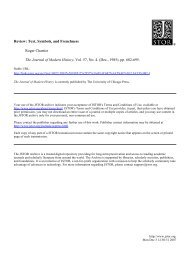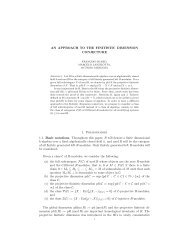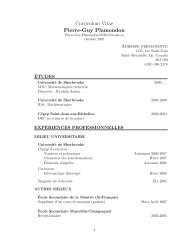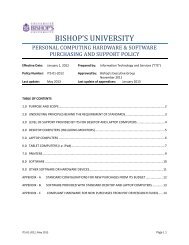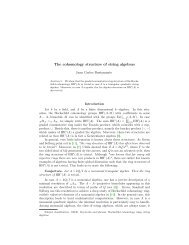Biological Sciences - Bishop's University
Biological Sciences - Bishop's University
Biological Sciences - Bishop's University
You also want an ePaper? Increase the reach of your titles
YUMPU automatically turns print PDFs into web optimized ePapers that Google loves.
156 • Bishop’s <strong>University</strong> 2013/2014<br />
BIL 393a Planning and Analysis of<br />
<strong>Biological</strong> Experiments Laboratory 1-0-3<br />
The laboratory provides hands-on training in setting up experiments and analyzing their<br />
results using the open-source statistical language R. This is widely used in both academic<br />
and industrial settings, is powerful, and is freely available. It provides many tools<br />
for experimental design, data analysis, and graphical presentation.<br />
Corequisite: BIO393a<br />
Students with credit for BIL 291 cannot also receive credit for BIL 393.<br />
Professor van Hulst<br />
BIO 394b Biology of Cancer 3-3-0<br />
This course will review the broad subject of cancer development and treatment. In particular<br />
it will focus on taking concepts seen in cell biology and applying them to cancer<br />
cells. Among the topics reviewed will be: cancer types and staging, mutation rates<br />
and environmental contributions to genetic changes, oncogenes and tumor suppressors,<br />
cell proliferation/death balance, modification of cancer cells phenotypes and metastases<br />
formation, role of the immune system in the prevention of cancer spreading,<br />
strategies of cure, and a review of the body’s physiological responses to several forms<br />
of cancer.<br />
Prerequisites: BIO 336 AND either BIO 110 or BIO 201<br />
Offered in odd-numbered winters<br />
Students with credit for BIO 224 cannot receive credit for BIO 394<br />
Professor Chamoux<br />
BIO 411b Seminars in Health <strong>Sciences</strong> 3-3-0<br />
An advanced course discussing current topics in the Health <strong>Sciences</strong>. Students will be<br />
expected to critically evaluate recent scientific literature, prepare and deliver oral and<br />
written presentations, participate in discussions, and analyze research questions.<br />
Pre-requisites: BIO 208 AND BIO 336<br />
Restricted to students in year 3 or 4 (i.e. with less than 60 credits remaining of a B.Sc.<br />
Biology degree)<br />
BIO 412* Special Topics in Ecology and Conservation 3-3-0<br />
This course will discuss recent developments in specific areas of ecology, conservation,<br />
and/or zoology. The course content will vary from year to year, depending on the<br />
instructor’s area of expertise and the students’ interests.<br />
Prerequisite: BIO 205a, BIO 207a<br />
Students with credit for BIO 362 cannot also receive credit for BIO 412.<br />
Staff<br />
BIO 421a Independent Studies in Biology I 3-1-3<br />
This course is intended for final-year students who wish to pursue in-depth study of<br />
a particular area of biology or who have a special need for a biology course that would<br />
otherwise not be available during their final semester of course work. This course can<br />
only be done in close collaboration with a faculty advisor from within the Department<br />
of <strong>Biological</strong> <strong>Sciences</strong>, and may not be used as a supplement to a student’s honours<br />
project. Requirements for this course will be agreed upon by at least three professors<br />
from within the Department of <strong>Biological</strong> <strong>Sciences</strong>.<br />
Pre-requisite: Consent of a member of the Department of <strong>Biological</strong> <strong>Sciences</strong><br />
Students with credit for BIO 371 cannot also receive credit for BIO 421.<br />
Coordinator: Professor Savage<br />
BIO 422b Independent Studies in Biology II 3-1-3<br />
This course represents an additional semester of independent work, either a continuation<br />
of or a separate course from BIO 421a, meant for final-year students who wish to<br />
pursue in-depth study of a particular area of biology or who have a special need for a<br />
biology course that would otherwise not be available during their final semester of<br />
course work. This course can only be done in close collaboration with a faculty advisor<br />
from within the Department of <strong>Biological</strong> <strong>Sciences</strong>, and may not be used as a supplement<br />
to a student’s honours project. Requirements for this course will be agreed<br />
upon by at least three professors from within the Department of <strong>Biological</strong> <strong>Sciences</strong>.<br />
Pre-requisite: Consent of a member of the Department of <strong>Biological</strong> <strong>Sciences</strong><br />
Students with credit for BIO 372 cannot also receive credit for BIO 422.<br />
Coordinator: Professor Savage<br />
BIO 428b Advanced Physiology 3-3-0<br />
This course will examine how animals adapt to environmental stresses such as extremes<br />
of temperature of altitude, hypoxia, water limitation and dietary changes. Short-term<br />
(acute), medium-term (acclimatory) and chronic (evolutionary) adaptations will be discussed.<br />
Pre-requisite: BIO 336a; Pre-or Co-requisite: BIO 337b<br />
Offered in even-numbered winters<br />
Students with credit for BIO 328 cannot also receive credit for BIO 428.<br />
Professor Hull<br />
BIO 433b Advanced Exercise Science 3-3-0<br />
This course examines selected topics in Exercise Physiology. Through traditional lectures,<br />
directed readings, seminars, and case studies, students will study short-term and<br />
long-term adaptations to exercise. We will also examine the scientific principles underlying<br />
sports-related topics such as optimizing exercise performance, injuries, and injury<br />
repair.<br />
Prerequisite: BIO 336 or Exercise Science 127 or Exercise Science 128<br />
Offered in odd-numbered winters<br />
Students with credit for BIO 333 cannot also receive credit for BIO 433.<br />
Note: See Exercise Science 433. Students may not take this course for credit if they have<br />
received credit for EXS 433.<br />
Professor Hull<br />
BIO 442b Bioethics 3-3-0<br />
Ethical aspects of modern biology, biotechnology, and medicine. Topics to be discussed:<br />
Use and abuse of biology, Transgenics and the changing world, Medical science<br />
today, Biology and Culture, Sociobiology, Limits to scientific inquiry. The animal<br />
rights controversy, cloning controversy, ethical imperatives, environmental issues,<br />
and medical ethics will be explored.<br />
Prerequisite: BIO 110a or BIO 201a<br />
Note: This course restricted to Biology, Biochemistry and Chemistry majors. Limited<br />
enrolment.<br />
Students with credit for BIO 252 cannot also receive credit for BIO 442.<br />
Professor Stroeher<br />
BIO 492b Honours <strong>Biological</strong> Problems 3-1-6<br />
An introduction to the planning, execution and reporting of biological research. Each<br />
student is required to choose a research problem and, in consultation with a departmentally<br />
approved supervisor, draw up a formal research proposal of work to be undertaken.<br />
The final mark in this course will be based on the research proposal, preliminary<br />
research completed on the stated project, and presentation of a poster during the final<br />
week of classes. Satisfactory completion of BIO 491 with a minimum mark of 75%<br />
will permit enrollment in BIO 492.<br />
Prerequisite: Permission of course coordinator. (Dr. Savage)<br />
Co-requisite or prerequisite: BIO 386a<br />
Students with credit for BIO 362 cannot also receive credit for BIO 491.<br />
BIO 493 Advanced Honours <strong>Biological</strong> Problems 3-1-6<br />
A continuation of BIO 491, in which the student will complete all research as outlined<br />
in the research proposal. The final mark in this course will be based on the quality and<br />
amount of research completed, presentation of a departmental seminar during the final<br />
week of classes, open to the public, based on research findings, and submission of a<br />
final written honours thesis. Enrollment in BIO 493 is conditional upon completing<br />
BIO 492 with a minimum mark of 75%.<br />
Students with credit for BIO 463 cannot also receive credit for BIO 492.<br />
Cognate courses<br />
BCH 381 (Immunology), ESG 262 Introduction to GIS), ENV 241<br />
(Environmental Chemistry I), ENV 242 (Environmental Chemistry<br />
II), ENV 337 (Economics of the Environment), ENV 375<br />
(Environmental Physics), ENV 437 (Ecological Economics), and<br />
ESG 250 ( Geomorphology) are cognate Biology courses and can<br />
count towards the Life Science concentration options.


